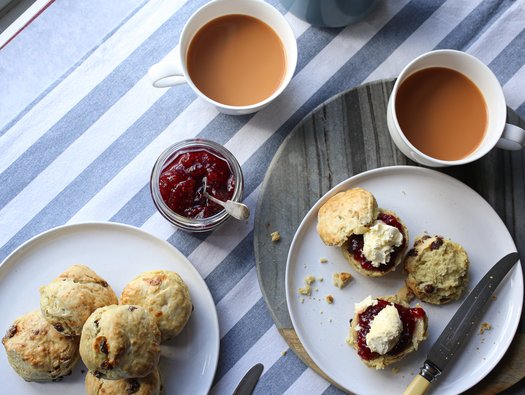Low phosphate sultana scones

This low phosphate and low potassium afternoon tea is ideal for a special occasion treat. Just decide if you’re cream first, topped with jam, or vice versa!

This low phosphate and low potassium afternoon tea is ideal for a special occasion treat. Just decide if you’re cream first, topped with jam, or vice versa!
450g plain flour
1 teaspoon bicarbonate of soda
250ml lemonade
250ml double cream
100g sultanas
50ml milk (to brush on top)
280g clotted cream
448g jam
Pre heat the oven to 200C /gas mark 6. Mix the flour, bicarbonate of soda, lemonade, double cream and sultanas in a bowl to make a dough.
Knead briefly then tip on to a floured surface and use your hands to pat the dough out to about a 3cm depth. Cut out 14 scones using a standard round cutter and place on a greased or lined baking tray.
Brush the top of each scone with a little milk, then leave them to rest for 10 minutes. After 10 minutes, put the baking tray in the pre-heated oven and bake for 10 to 12 minutes, until brown and risen.
Split each scone in half and top each piece with half a tablespoon (16g) of your favourite jam and a third of a tablespoon (10g) of clotted cream. Serve one scone (two halves) per person.
The lemonade, flour, dried fruit and jam are the main sources of carbohydrate in this dish. The carbohydrate values have been provided for those who have trained in insulin adjustment.
These scones are low in phosphate due to the use of bicarbonate rather than baking powder or self-raising flour. Follow the method to ensure you get a good rise on your scones. Despite the use of sultanas, a high potassium ingredient, this recipe is still low in potassium when following the quantities and serving sizes suggested.
This recipe is low in protein and makes a suitable treat for those following a low protein diet.
Use gluten-free plain flour.
If you want to reduce the amount of sugar and fat you eat, use diet lemonade, keep the portion of jam small and switch the clotted cream for an alternative such as low-fat crème fraiche or low-fat spread. You could also try making the recipe with half wholemeal plain flour to increase the fibre.
Once cooled, store in an airtight container in the fridge and eat within three days. If you prefer to freeze the scones just wrap them individually and freeze for up to three months. Defrost thoroughly before eating.
The less you handle the dough, the fluffier the scones will be! Don’t twist the cutter, instead press straight down and avoid touching the sides when you transfer them to a baking tray, If the edges smear they don’t rise as well. To avoid overindulging, you could halve the recipe to make six scones.
Living with kidney disease doesn’t mean missing out on all baked goods, even on a low-phosphate diet. Kidney Kitchen recommends some tips and tweaks to help make your bakes a little more kidney-friendly.
You can enjoy a wide variety of delicious and healthy food when you are living with kidney disease. All Kidney Kitchen recipes are analysed and approved by kidney dietitians. Search through our kidney-friendly recipes or filter them by category below.
A tasty savoury alternative to a bread roll with soup, or enjoy in your packed lunch.
By giving us your email address, you're giving us permission to send you the latest news from Kidney Care UK. Further information about how we protect and use your personal data is available in our Privacy policy. If you would like to change the way we communicate with you at any time please email [email protected]. You can unsubscribe at any time by using the link at the bottom of every email we send.